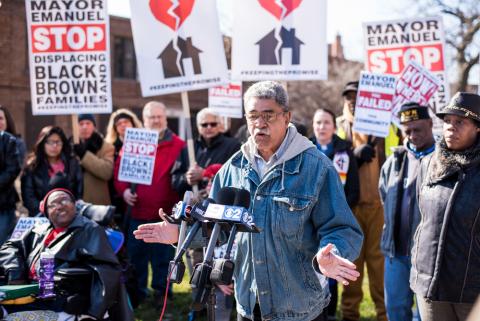As if to underscore his irrelevance in the March 15 primary, Mayor Rahm Emanuel chose that day to speak out against the Chicago Housing Authority.
Maybe he forgot that he runs the CHA. It was kind of like President Barack Obama denouncing the State Department.
Emanuel was criticizing the “supervoucher” program that raises rent limits on housing vouchers in order to enable poor families to live outside low-income neighborhoods.
There are many levels of absurdity to this story, but perhaps the height of it is Emanuel’s emphasis that the program “pre-dates my tenure.”
That’s true, but he’s been mayor for five years. He was mayor two years ago when Crain’s wrote about the program and U.S. Representative Aaron Schock (the downstate Republican who since resigned as a result of his own spending scandal) requested an investigation by the inspector general of the U.S. Department of Housing and Urban Development.
Emanuel was still mayor a few months later, when CHA announced it was scaling back the program, lowering the rate of “exception” rents for vouchers in “opportunity areas” from 300 percent of HUD’s fair market rent to 150 percent.
But now, as if he knows none of this history, Emanuel says the program has “an admirable goal” – moving low-income families out of segregated neighborhoods – but it was “executed poorly.”
The mayor was responding to a Sun-Times series, reported in collaboration with the Better Government Association, that featured screaming headlines to expose the same program Crain’s Chicago Business had uncovered two years earlier. What the Sun-Times series added to this old news (as Daniel Kay Hertz and Amanda Kass detail at City Notes) was a bizarre focus on individual voucher holders living in high-rent areas, suggesting they were to blame for the shortage of housing for 50,000 families on the CHA’s voucher waiting list.
Hertz and Kass provide context missing from the series – including the fact that the $7.5 million spent on the supervoucher program is less than 2 percent of the CHA’s $470 million budget for housing vouchers.
Emanuel showed that he grasps the problem, however: money spent on “incredibly expensive housing” wasn’t available to provide vouchers for families on the waiting list. “That, to me, is what’s wrong,” he told Sun-Times reporter Fran Spielman.
Obviously, this begs the question: if you’re concerned about getting more vouchers to more families, why did you allow CHA to divert funding for over 13,500 vouchers a year – as Kass and colleagues at the Center for Tax and Budget Accountability showed in a 2014 study – in order to build up $400 million in financial reserves?
Emanuel may even recall a press conference last July where he appeared with HUD Secretary Julian Castro, who said, “The level of reserves were higher than ought to be the case.” Emanuel assured critics there was a plan to increase spending on housing.
BGA has noted this; executive director Andy Shaw recently called CHA’s stockpiling of funds “the most egregious recent violation of public trust” in Chicago or Illinois (which is saying a lot). And when BGA asked CHA for its spending plan, the one-page document offered in response lacked “a clear plan or...solid commitment,” according to Shaw.
Maximizing access to housing vouchers gets lip service from the mayor, but it’s not a high priority for his CHA. The same seems to be true for maximizing access to higher-income neighborhoods.
That’s the conclusion housing advocates draw from the plan for Lathrop Homes, the historic low-rise CHA development at North and Clybourn avenues. A plan to redevelop Lathrop as mixed-income, with a net loss of 525 public housing units, was approved by the City Council’s zoning committee last Wednesday – just one day after Emanuel praised the goal of locating public housing families in more diverse neighborhoods.
Last month CHA chief executive Eugene Jones issued a statement saying CHA is committed to replacing the units eliminated from Lathrop on the North Side – “based on the availability and price of the properties.” Sociologist Mary Pattillo, who has studied public housing in Chicago, argues there’s nothing to guarantee this won’t be one more in a long history of broken promises.
What Lathrop residents and their supporters now seek is a detailed commitment on replacing the 525 units on the North Side – and they want it from the mayor himself. On the day of the zoning committee hearing, they delivered a letter to Emanuel.
“Mayor Emanuel, you must not allow this plan to proceed without a written, specific plan for replacing the eliminated units on-site or in the surrounding communities,” including a clear timeline for replacing the units, designated funding and mechanisms for accountability, according to the letter, signed by J. L. Gross of the Lathrop Leadership Team and Rev. Bruce Ray of the Logan Square Ecumenical Council.
Protestors underscored their seriousness by occupying one of the hundreds of vacant units at Lathrop.
Like Chicago Public Schools, CHA is under complete mayoral control. Emanuel appoints the board of directors and designates its president, and he appoints the chief executive. Under Emanuel, CHA has become an ongoing scandal, with construction of new units slowing to a near standstill. Yet last month Alderman Joe Moore, chair of the housing committee and staunch Emanuel ally, refused to allow a vote on the Keeping the Promise Ordinance, which would require one-for-one replacement of lost units and full utilization of vouchers.
If Emanuel wants to be taken seriously when he talks about the value of expanding access to diverse neighborhoods, he needs to step up with a serious plan for Lathrop Homes.
Curtis Black is a blogger for The Chicago Reporter.


Spread the word